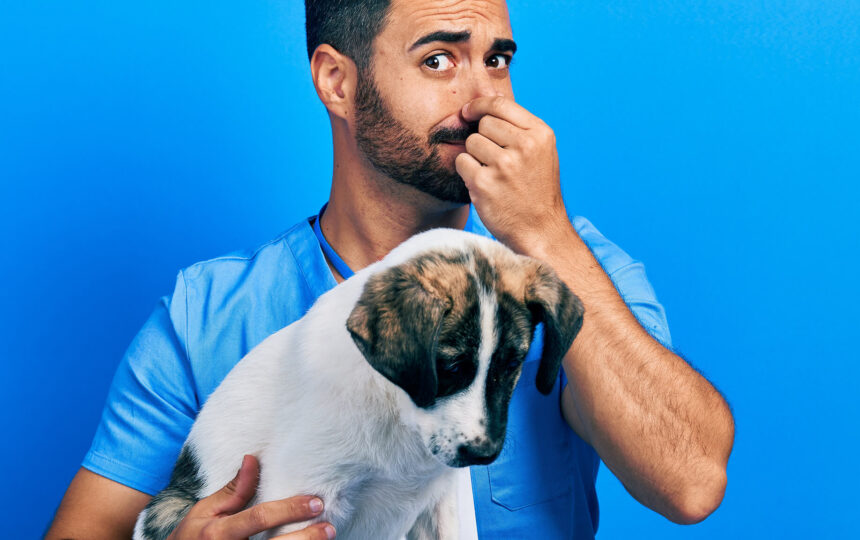When you brought home that adorable ball of fur, you probably imagined all the fun and cuddles ahead, not the perplexing stench that can sometimes accompany your four-legged friend. If you’ve ever played detective, following your nose around your pet trying to locate the source of that mysterious smell, you’re not alone. Many pet owners face this common but often misunderstood issue. Body odor in pets can be a puzzling phenomenon – is it their natural scent, or is there something more going on? Unraveling this mystery is essential, not just for the sake of your nose, but for the health and happiness of your furry companion.
Before diving into the reasons, it’s helpful to play a little game of ‘follow the stench.’ Is the smell emanating from their mouth? Maybe it’s their ears that are giving off that funky vibe. Or perhaps it’s their coat that’s the culprit. Sometimes, the answer might be right under your nose (quite literally). After all, if Sherlock Holmes had a dog, I bet he’d say, “The scent is afoot!”
With a keen nose and a bit of investigation, you can usually pinpoint the source of the odor, which is the first step in addressing it. Let’s explore 12 not-so-obvious reasons behind your pet’s body odor and how to tackle them effectively.
Identifying the Odor Source: Sniffing Out the Culprit
Before you start any treatments or changes in your pet’s routine, it’s important to identify where exactly the odor is coming from. Is it a general body odor, or is it localized to a specific area like the ears, mouth, or paws? A localized smell is often easier to treat and can give you a clear indication of the underlying issue. For instance, a foul smell from the mouth could indicate dental problems, while a yeasty smell from the ears might point to an infection.
1. Yeast Overgrowth
- Cause: A common cause of foul odor in pets is yeast overgrowth, often occurring in their ears or paws.
- Solution: Regular cleaning and drying of your pet’s ears and paws can help. If the problem persists, consult a veterinarian for antifungal medication.
2. Poor Diet
- Cause: A diet lacking in essential nutrients or high in carbohydrates can lead to poor skin health and odor.
- Solution: Switch to a high-quality, balanced diet. Consider a diet with fewer carbs and more protein.
3. Allergies
- Cause: Allergies can cause skin infections and oily skin, leading to an unpleasant smell.
- Solution: Identify and eliminate allergens. Your vet may recommend special diets, medications, or allergy shots.
4. Infrequent Bathing
- Cause: Not bathing your pet often enough can lead to an accumulation of oils and dirt on their skin and fur.
- Solution: Establish a regular bathing schedule. Use a pet-friendly shampoo and ensure thorough rinsing.
5. Dental Issues
- Cause: Bad breath or periodontal disease can cause a foul odor.
- Solution: Regular dental check-ups and teeth cleanings, along with daily teeth brushing, can prevent dental issues.
6. Anal Gland Problems
- Cause: Impacted or infected anal glands emit a strong, foul odor.
- Solution: Regular vet visits for anal gland expression and check-ups. High-fiber diets can also help.
7. Skin Infections
- Cause: Bacterial or fungal skin infections can cause a distinct odor.
- Solution: Seek veterinary care for appropriate medications and topical treatments.
8. Ear Infections
- Cause: Ear infections, common in dogs with floppy ears, can produce a strong smell.
- Solution: Regular ear cleaning and keeping the ears dry. Visit a vet for severe infections.
9. Urinary Tract Infection
- Cause: UTIs can cause a urine-like smell on your pet’s body.
- Solution: Veterinary examination and antibiotics are usually required to treat UTIs.
10. Seborrhea
- Cause: This skin condition causes an overproduction of skin oil, leading to a musty odor.
- Solution: Medicated shampoos and regular grooming can help control seborrhea.
11. Wet Fur for Too Long
- Cause: Allowing your pet’s fur to stay wet for extended periods can lead to a mildewy smell.
- Solution: Dry your pet thoroughly after baths or swims.
12. Lack of Grooming
- Cause: Neglecting regular grooming can lead to a buildup of dirt, oil, and dander.
- Solution: Regular brushing and grooming, particularly for long-haired breeds, are essential.
When to Seek Professional Help
While many causes of pet body odor can be managed with at-home care and keen attention, there are times when the stench is a red flag for something more serious. Knowing when to consult a veterinarian is crucial in ensuring your pet’s health is not at risk. Here are scenarios where professional help is warranted:
Persistent Odor Despite Good Hygiene: If the odor persists despite regular baths, grooming, and dental care, it could indicate an underlying medical issue.
Odor Accompanied by Physical Changes: Look out for changes such as skin irritation, hair loss, unusual lumps, or changes in eating habits accompanying the odor..
Sudden Onset of Strong Odor: If your pet suddenly starts to emit a strong, unpleasant smell, it could be a sign of infection or disease.
Odor from the Mouth That’s Affecting Eating Habits: If bad breath is causing your pet to eat less or show signs of discomfort while eating, there may be dental or gastrointestinal issues.
Strong Urine or Ammonia-like Odor: A strong smell of urine or ammonia, especially in cats, can indicate a urinary tract infection or kidney disease.
Foul-Smelling Ears: If your pet’s ears have a strong, yeasty smell and are accompanied by discharge, it could be an ear infection.
Intense and Persistent Anal Odor: A constant, strong smell from the anal area might suggest impacted or infected anal glands.
Conclusion
Unmasking the secret behind your pet’s body odor can be a journey filled with unexpected twists and turns (and a few whiffs of mystery). It’s a journey that requires a bit of detective work, patience, and maybe a good sense of humor to get through the more fragrant moments. Remember, while a smelly pet might provide material for some good jokes among friends, it’s important to take their health seriously.
Regular check-ups, proper grooming, and being attentive to dietary needs are essential in keeping your pet smelling fresh and staying healthy. If the stench persists despite your best efforts, it might be time to consult the vet. After all, a healthy pet not only smells better but also makes for a happier home. So, next time you’re cuddled up with your furry friend and catch a whiff of something suspicious, don’t just hold your nose – consider it a nudge to delve deeper into their well-being. Because when it comes to pets, love isn’t just blind; sometimes, it’s a bit on the nose!






